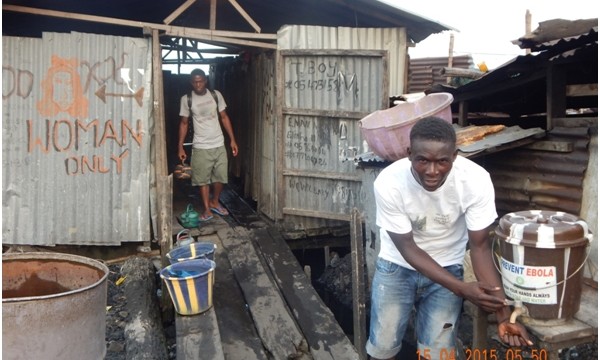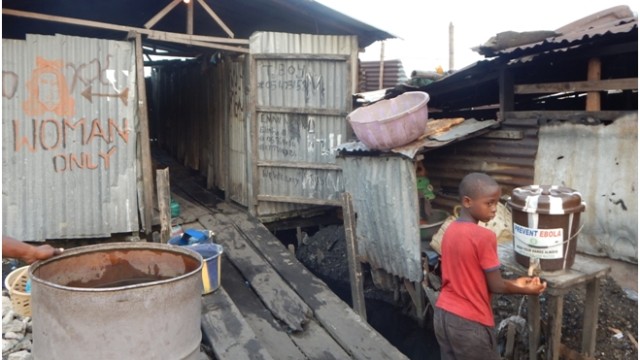MONROVIA, Montserrado – The last time James Sackie saw his father was on August 19, 2014. On that day, Sackie’s father, John Sackie, had fallen sick, vomiting and experiencing severe pains in his joints. No one except James would interact with his father, due to fear of contracting the deadly ebola virus that hit Liberia last year.
Sackie quickly ran to the M.V. Massaquoi School, the nearest place with an Ebola quarantine in West Point at the time. He told health workers that his father was in critical condition and needed medical care, but they refused to come for him. A few hours later, Sackie’s father died.
His mother abandoned him and his little sister Rose since he was 5 years old, and he has since been informed by relatives that his mother is deceased.

James teaches a little child how to wash his hands after using the toilet. Photo Credit: Stephen Kollie
Sackie had attended a private high school until the tenth grade when his father died. He stopped going to school due to lack of financial support and has become a makeshift latrine worker.
“I am not doing anything about school now,†Sackie said. “The school in West Point is free of charge but I can’t go there because it is below my grade level. I am just hoping now that I can get in a trade school and do something else.â€
The only government school in the Monrovia community of West Point is the M.V Massaquoi Elementary and Junior High School which was previously used as quarantine and holding center for suspected Ebola victims when the disease became uncontrollable.
The slum community of West Point came under local and international spotlight last year when angry residents stormed the holding center and looted all materials in it. Security forces fled the school while victims of the disease who were awaiting transfer to the Ebola Treatment Unit fled as well, putting the rest of the community at risk.
Sackie manages a zinc built toilet facility in West Point, owned by a man he now considers as his father. People come to his facility to use the toilet and to take a bath with either cold or warm water. It cost LR$10 for one bucket of cold water and LR$15 for warm water.
At the back of the toilet lies the Du River, a polluted river that divides West Point and the Bushrod Island in Clara Town. The waste from Sackie’s toilet is dumped into the Du River. Around the latrine are makeshift bathrooms made of wood and old zinc that are privately owned by some West Pointers. Those that cannot afford to build a bathroom in the Battlefield community must make use of Sackie’s bathrooms.
The 24-year-old hopes to get back to school soon once he has the finances. For now, he lives in a zinc house full of bundles of mineral water and garbage bags that his uncle normally sells to companies that recycle.
Sackie said he hates his present job because many of his former school mates insult and laugh at him when they visit his facility.
“Sometimes when am doing my job my friends come around to play mockery out of me,” he said. “But I have no option because I don’t have any other means to survive.”
He said, “They tell me this kind of job is not good for a young person like you. It’s really a great loss for me to have lost my father at that time.â€
The battlefield community was once used as a military base for government forces loyal to former Liberian President Charles Taylor during the Liberian civil unrest.
Sackie was very young at the time but can still remember when soldiers asked him to carry ammunitions.
“They gave me mortar to carry along with them,” he said.
Featured image courtesy of Stephen Kollie




